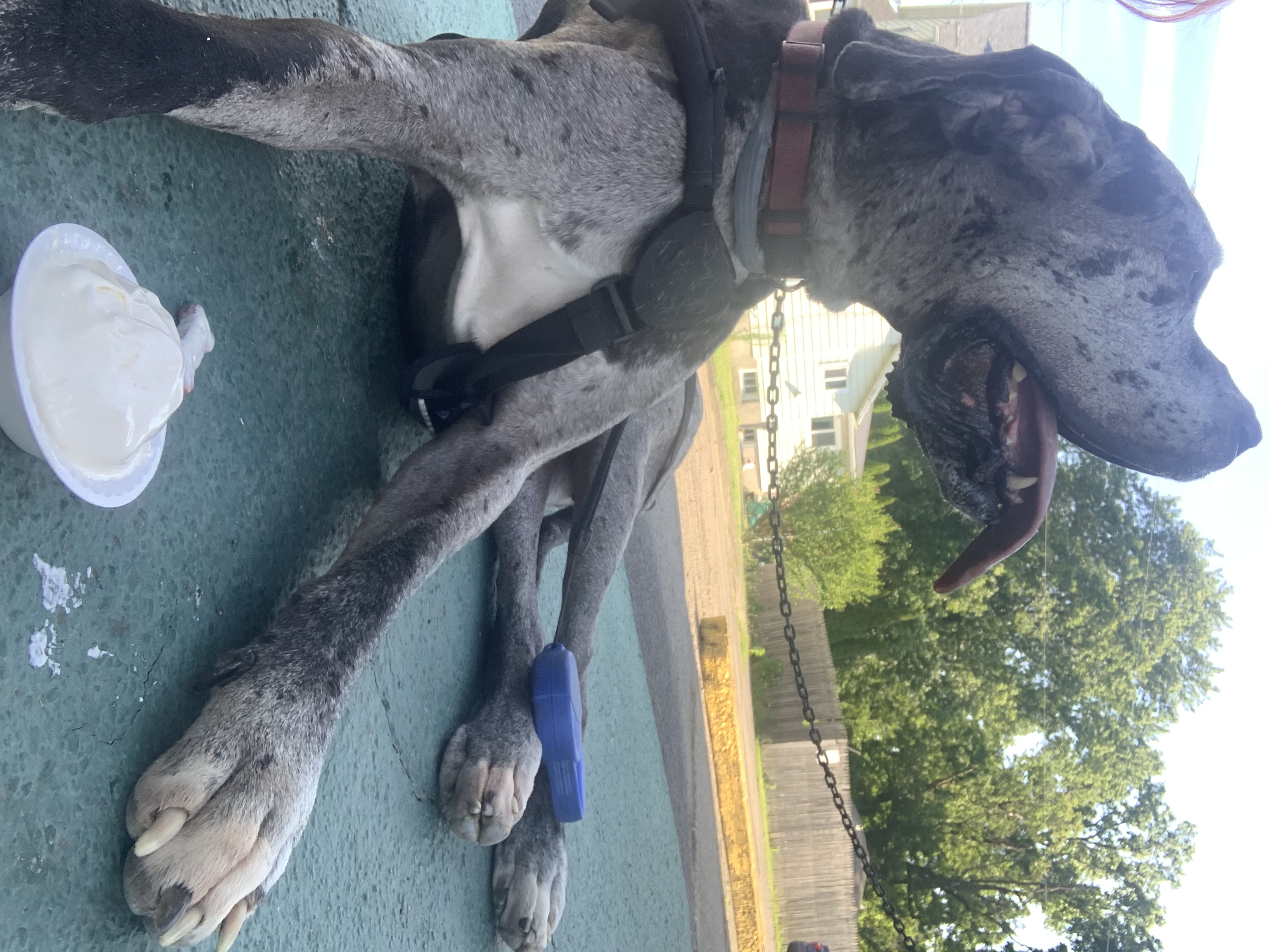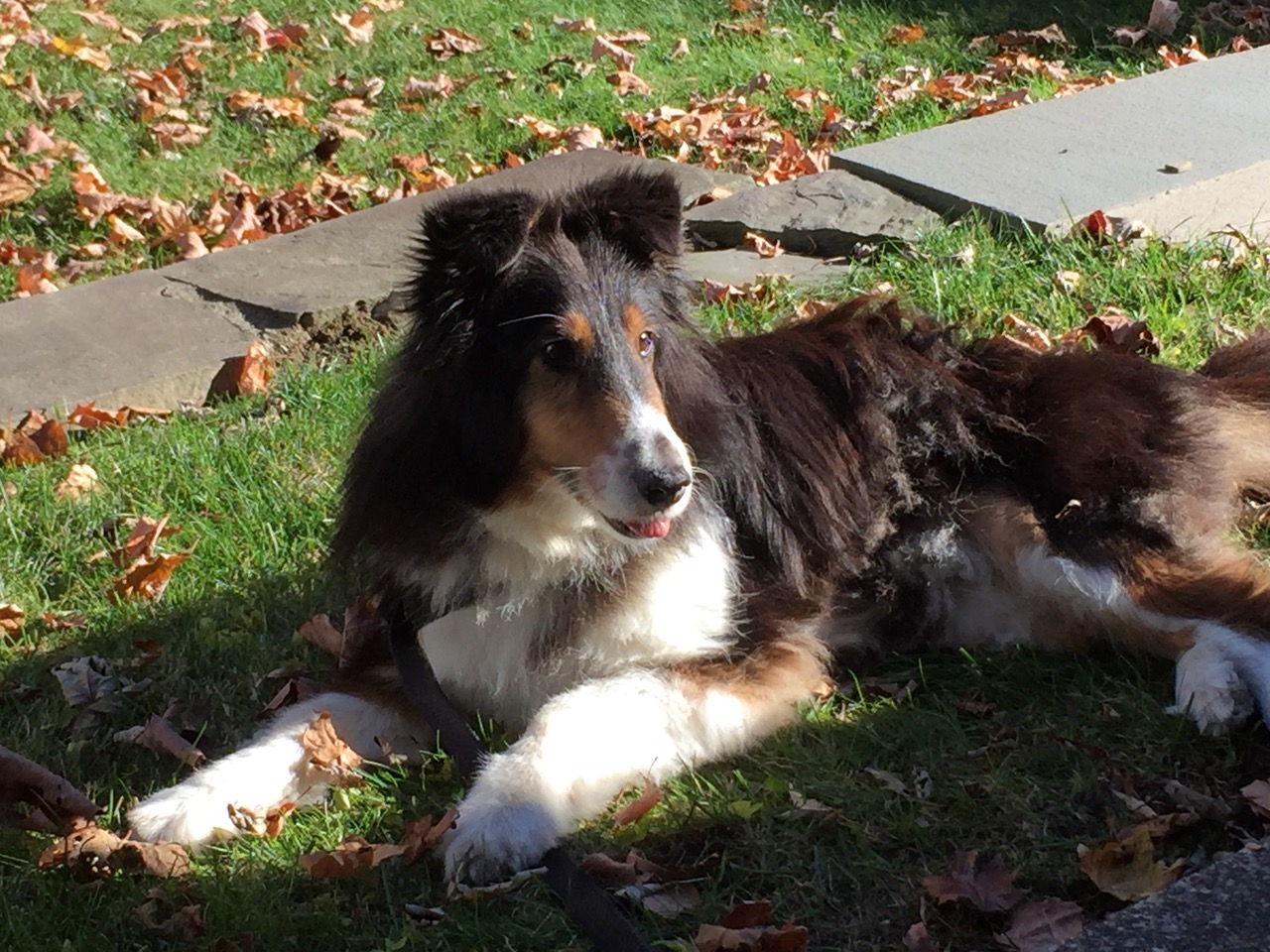Neurology & Neurosurgery
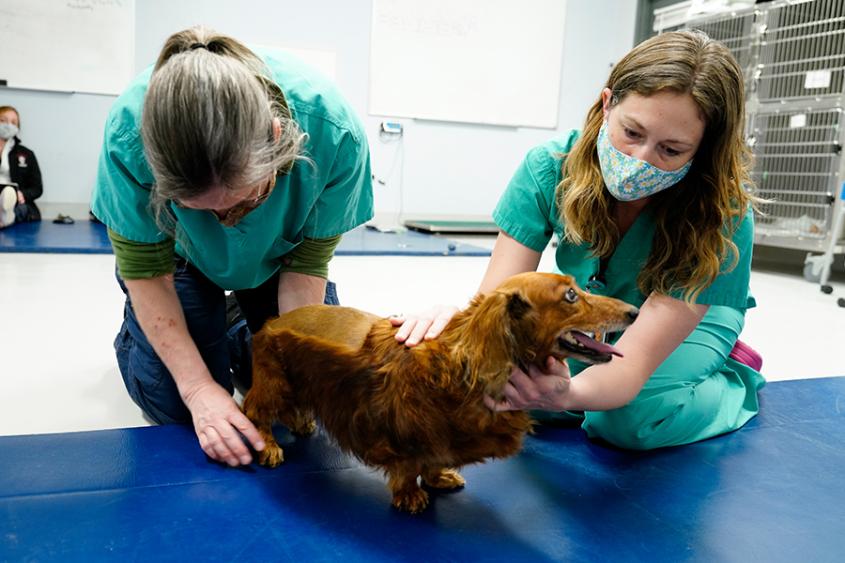
The Cornell University Hospital for Animals’ board-certified veterinary neurologists and neurosurgeons are experts in diagnosing, treating, managing neurologic disorders. They have access to specialized equipment that includes an MRI and work closely with specialists throughout the hospital to ensure comprehensive care, from diagnosis to treatment to rehabilitation and post-operative care. Our state-of-the art diagnostics and imaging options enhance our abilities to diagnose difficult and complex diseases.
View the Neurology & Neurosurgery Photo Gallery
Harpo's Story
We truly cannot thank Cornell University Hospital for Animals, and specifically the entire neurology team, enough. Your responsiveness, knowledge, compassion and care cannot be matched anywhere else! We honestly rave about how incredible the whole experience was and we are so grateful for everything they did for our dog Dusty. They saved his life, helped him to walk again and treated him like he was their own personal dog. I never had to worry for a second while Dusty was in their care. From the informative first phone call from Dr. Folk that was filled with kindness to the discharge and follow up, we were in awe of our entire experience. I share our positive experience so often and would recommend them 10/10 times to anyone. We are forever grateful and blown away by our experience. Thank you for everything! The extraordinary care for our little pup meant everything to us!
Client Reviews
Bill
We had a great experience with Cornell’s emergency and neurology services. We were seen shortly after we arrived and the emergency and critical care veterinarian gave us hope that Bill could get back to almost his full self. We were given options on how it could happen. I can't tell you how scared I was leaving him there. I am sure most people with furry friends feel the same! I was comforted by the calls from Bill's surgeon keeping us informed about the plan each step of the way and also the updates from either the veterinarian or veterinary student before and after surgery. They kept us posted on his progress and we felt we made the best decision for him after having many conversations with the veterinarian. It was also scary bringing him home and trying to adjust to a new way of life for a little bit. The first time he wagged his tail, we all cried tears of joy! Even though the veterinarian told us it would be slow progress, it seemed as though Bill was on his way back to being himself. Three months later he still walks like a drunken sailor all on his own, goes to the bathroom on his own and is pretty much back to his ornery old self. We wouldn't have it any other way. Sincere thanks to the staff for the great care they gave Bill.
Big John
You guys have been nothing short of amazing! My dog now has a higher quality of life since since all of the unanswered questions that we have had so long about what was causing his issues have been answered.
Fame
Our Shetland Sheepdog, Fame, has been a patient with Cornell's neurology service for over a decade. She suffered her first seizure when she was about a year and a half old and has been under the care of the neurology staff since that traumatic event. As she approaches her thirteenth year, her seizures are fully controlled. We feel fortunate to have such a caring and professional facility nearby. Fame’s quality of life would not be the same without the Cornell neurology service.
Shadow
When we first brought Shadow in, it was a very distressing day and the help that we received from the minute we got there was so reassuring. To have to leave your puppy with strangers for four days or more was made so much easier because we knew you would do everything for him. Once we were able to bring him home I knew I could call anytime with questions. We went from three to four visits a year to now just having a yearly check up. He always likes to show the team what a big strong boy he still is.
What to Expect at an Appointment
Your animal will be seen and cared for by one or both of the board-certified neurologists. Because we are a teaching hospital, veterinary students and residents will also participate in caring for your animal with three experienced licensed veterinary technicians (LVTs) assisting and providing additional support during all aspects of the visit, diagnostics and treatment. Veterinary students have graduated from four-year colleges and are in the midst of an additional four years of medical education to become DVMs, or Doctors of Veterinary Medicine. Neurology residents are experienced veterinarians who are taking two to four years of additional training specializing in the neurological diseases of animals, much like residents in human medicine. Our team also provides 24-hour emergency care for animals with immediate neurological and neurosurgical needs. There are many veterinary specialists practicing at our hospital with whom we collaborate as needed for each patient.
When you have a scheduled appointment please bring your pet fasted, meaning no food in the morning prior to the appointment. Allow your pet to have free access to water. The visit begins with the veterinary students on rotation. They will ask you questions about your pets medical history the problem they are experiencing. The student then provides that information to the the neurologists and will take your pet to have a physical and neurologic exam performed. The team will discuss their findings with you along with diagnostic and treatment recommendations. Some components of comprehensive diagnostics and treatment options may require your pet to be anesthetized and thus unavailable the same day. This includes MRI, which we will schedule with our anesthesia and imaging teams as soon as possible. We will always offer you a chance to go home, and discuss the options with other family members. We are here to help and want provide the best care for both you and your pet.
Success Stories
Chewie
When Chewie, a shih tzu-poodle, began having seizures at the age of two, his owners brought him to the Neurology Service in January 2022. He had started to display seizure behaviors in early 2020, and after receiving medicine and treatment for a year, the family’s primary care veterinarian recommended an MRI at CUHA. Leading up to the appointment, however, Chewie went into status epilepticus (prolonged seizure activity). Status epilepticus is considered a life-threatening condition in dogs when the seizures are not self-limiting. His loving owners flew back from their vacation on the first available flight to get Chewie to Cornell.
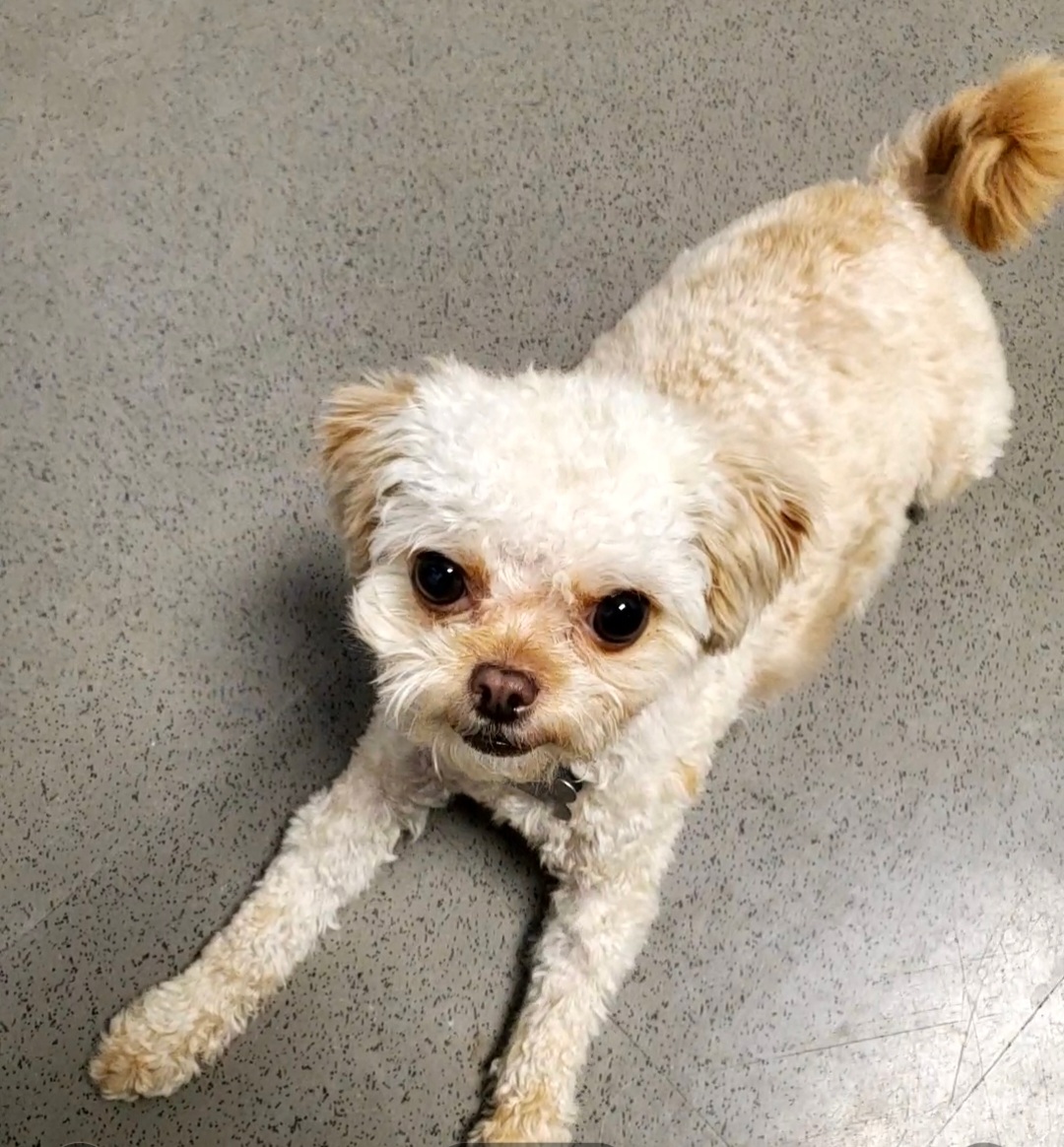 The Emergency Service veterinarians and staff were able to stabilize Chewie and transfer his care to the Neurology Service. Upon examination by Dr. Patricia Lawler (second-year Neurology resident) and Dr. Christine Senneca (DACVIM Neurology Locum), Chewie was placed under general anesthesia for both diagnostic and treatment purposes. General anesthesia is sometimes needed in order to stop the seizures and also allows for a brain MRI and cerebrospinal fluid collection to look for any cause(s) that could potentially elicit the seizure events. Since all the tests came back normal, Chewie was diagnosed with idiopathic epilepsy.
The Emergency Service veterinarians and staff were able to stabilize Chewie and transfer his care to the Neurology Service. Upon examination by Dr. Patricia Lawler (second-year Neurology resident) and Dr. Christine Senneca (DACVIM Neurology Locum), Chewie was placed under general anesthesia for both diagnostic and treatment purposes. General anesthesia is sometimes needed in order to stop the seizures and also allows for a brain MRI and cerebrospinal fluid collection to look for any cause(s) that could potentially elicit the seizure events. Since all the tests came back normal, Chewie was diagnosed with idiopathic epilepsy.
Idiopathic epilepsy is a diagnosis of exclusion, implying recurrent and unprovoked seizures without any apparent cause. Seizures can look different from patient to patient. Usually, generalized seizures are when a patient falls down on their side (or it can begin when they are asleep); they may urinate and/or defecate, and they paddle their front and/or hindlimbs. Seizures cannot be interrupted by calling their name, as they are unaware of what is happening. Sometimes certain dogs can exhibit signs that their owners are able to pick up on before having a seizure; for example, a dog may display signs of being clingy, acting different, pacing around the room, etc.
Chewie was hospitalized at Cornell for four days. After being released and returning home, Chewie gained full mobility two weeks later, and is now being managed with long-term oral medications. His owners are happy to report that, after his three-month checkup, Chewie is doing well. “We would like to thank all the staff at Cornell for all your help, support and patience in answering our questions and taking the time to check in on Chewie. You have provided the best service we have ever had. We feel very blessed and thankful.”
Roscoe
Roscoe, a 13-year-old male neutered Russian Blue feline, was brought to the neurology service at the Cornell University Hospital for Animals (CUHA) in March 2021. He had a wobbly gait (ataxia) and vision abnormalities, and was having trouble navigating and jumping. An MRI of his brain revealed a large mass consistent with a type of tumor called a meningioma (a tumor of the lining of the brain), which was later confirmed from histopathology results. After discussing options with Roscoe’s owner, the large mass was surgically removed from Roscoe’s right forebrain.
Roscoe recovered from surgery and anesthesia as expected and was able to go home three days later. He went home on anti-seizure medication, pain medication and prednisolone. At his one-month recheck appointment, Roscoe showed significant improvement. He was playful, had a good appetite and seemed comfortable. He started taking oral chemotherapy medication to help prevent regrowth of the tumor, and is doing well.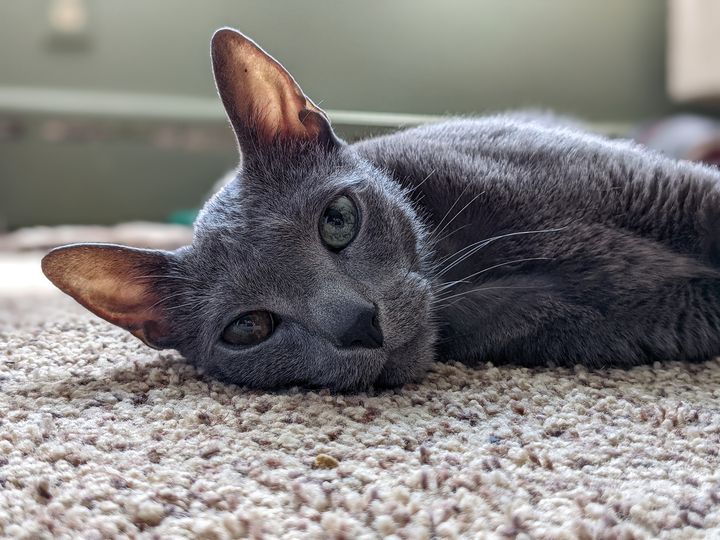
Roscoe’s owner, Sarah Bauer, thanks CUHA and says: “the Cornell neurology department is the BEST and your services saved Roscoe's life. Now he is back to normal, if not better than before. I cannot praise Dr. Rebecca Sandler enough! She realized that our cat isn't just a pet but a family member.”
Franklin
Franklin, a 2-year old Golden Retriever, first presented to Cornell University Hospital for Animals (CUHA) emergency service in July of 2020. He had been wobbly, losing some control of his movements (ataxic) and lethargic for several days at home. After being transferred from emergency to the neurology service for further examination an MRI of Franklin's brain was recommended. MRI was performed the next day under general anesthesia. The images captured by MRI revealed marked patchy bright areas in his forebrain and cervical spine. While Franklin was still anesthetized, a spinal tap was performed and a sample of cerebrospinal fluid was sent to the Clinical Pathology lab at Cornell's Animal Health Diagnostic Center. Franklin was diagnosed with Menigoencephalitis of unknown etiology (MUE). He was started on steroids and was able to go home the next day. Patients with MUE often experience seizure activity which was true for Franklin. He began receiving monthly cytosar infusions and anti seizure medication. Cytosar is a well-tolerated and effective chemotherapy to control inflammatory central nervous diseases. Franklin responded well to this treatment plan.
During one of Franklin's regularly scheduled cytosar appointments in the fall it was noted that he had been vomiting and having diarrhea at home. He was lethargic on presentation and had a fever. The neurology service facilitated an initial work up to see what might be going on. Radiographs of his chest showed aspiration pneumonia and an abdominal ultrasound showed blood clots throughout his abdominal veins. He was anemic and his white blood cell count changes were consistent with an infection. Franklin was transferred directly to the internal medicine specialists at CUHA. He received 2 blood transfusions and oxygen supplementation. The supportive care and treatment he received had him feeling much better the next day. He was ready to go home again soon after.
Franklin's health conditions are being well managed at home by dedicated owners and at Cornell by the neurology and internal medicine teams.
We wish Franklin a happy life and love to see that he continues to do so well!
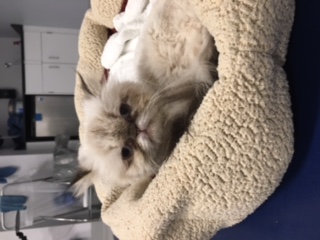 Willow
Willow
Willow, a 5-year-old female spayed Himalayan, presented to the Cornell Neurology & Neurosurgery service in November of 2020. She could move three of her legs but was unable to walk on her own. The neurologists recommended Willow have imaging of her cervical spine. Radiographs of her cervical spine showed an abnormal bony growth in her cervical vertebrae. She went on to have an MRI and CT scan performed that confirmed there was a fluid filled mass at her C3 vertebrae. Neurosurgery was performed to reduce the bulk of the mass relieving compression on Willow’s spinal cord. Samples were submitted to Cornell’s Animal Health Diagnostic Center with a resulting diagnosis of osteosarcoma.
Willow was referred to our colleagues in the Oncology service and began radiation therapy. Over the last few months Willow has returned for recheck appointments with neurology and oncology. Her follow up radiographs show there are no signs of osteosarcoma regrowth. Willow has gained the ability to walk around on her own and is getting stronger daily.
We are so happy to work collaboratively with the oncologists in continued support of Willow’s recovery and care.
A Special Tribute
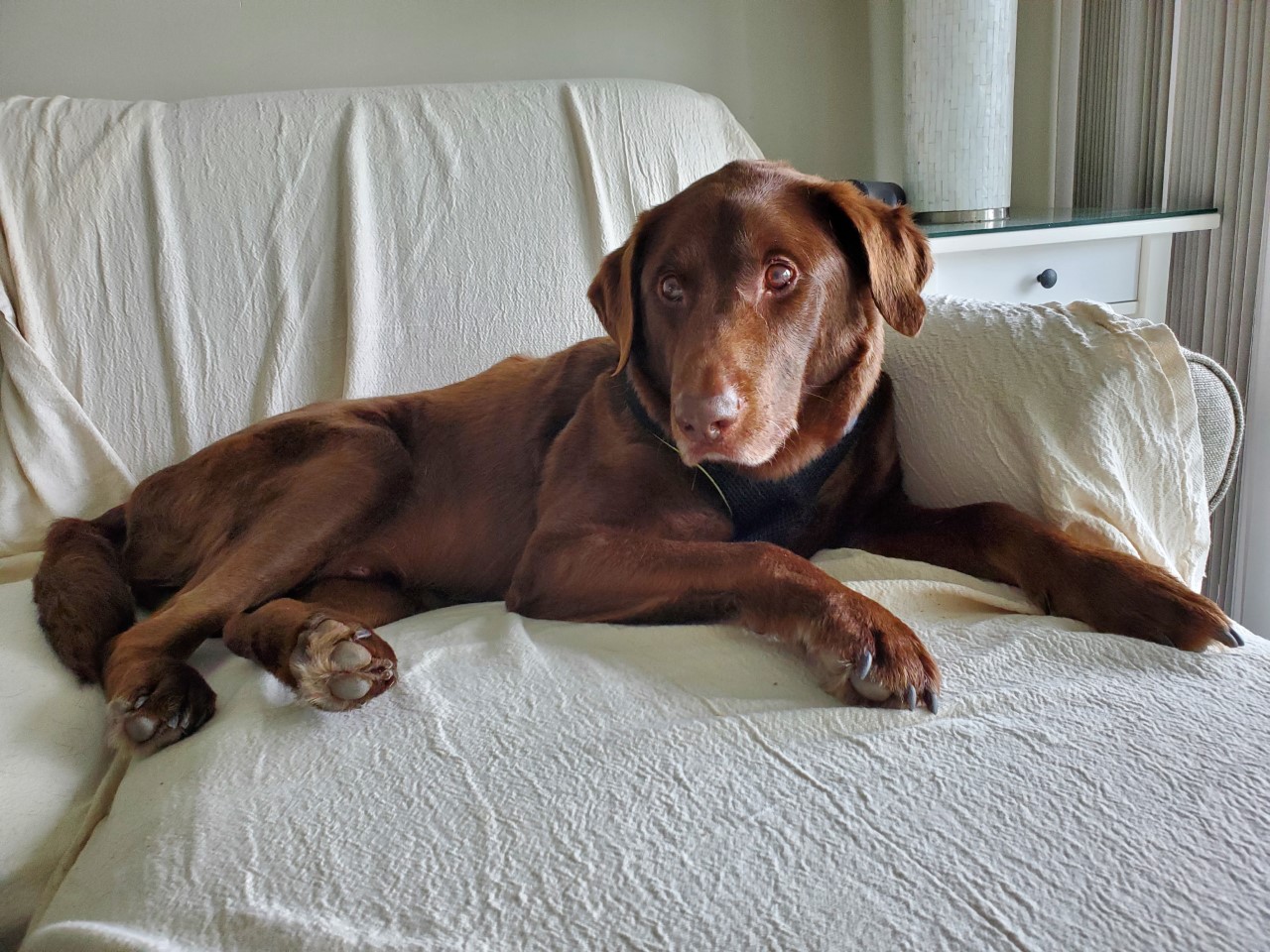
We adopted Sam in the fall of 2010 from a local rescue when he was approximately six months old. We believe that Sam was a lab/chessie mix. From the minute that we got Sam, we knew that he was not that typical happy go lucky lab. He just seemed off occasionally and was having periodic aggressive episodes that we now believe were partial seizures or linked somehow to his epilepsy.
Sam had his first generalized seizure about a month after his second birthday. We immediately contacted his vet and we did the standard blood work looking for a reason why he had a seizure. Nothing remarkable showed up on his blood work so we were hopeful that this seizure was a one off. I then started researching anything and everything that I could find that might prevent another seizure. I cleaned up his diet, added supplements and then six months later his seizures reappeared with a vengeance. This is when we began treating him with phenobarbital. Pheno worked for a while and then it didn’t so his vet added Zonisamide. At that time, our primary vet sensing that Sam might be a difficult case recommended that we go to Cornell for a consult.
In April of 2013, Sam had his first check up with Cornell’s neurology service. At this first visit, it was determined that Sam probably had presumptive idiopathic epilepsy. After that visit, I felt a sense of relief that although there was no cure, Sam could lead a normal full life. I also had a sense of security knowing that I would have the assistance of Cornell to help us through this unknown journey. We visited Cornell once a year throughout his life for his rechecks and in between visits they were always a phone call away when we were struggling.
Sam fought epilepsy for about nine years and later on in his life was also having issues with mobility and a painful vertebrate. Throughout his life, he had many ups and downs. His epilepsy at times was uncontrolled even though he was on a cocktail of four different anti-seizure medications that made him sleepy and impacted his mobility and stability. At times, early on he struggled with cluster seizures which were so scary. Last fall he survived a mast cell cancer. Through it all he was a fighter and did not let epilepsy or his other health issues define him. Sam led a full life. He earned his Canine Good Citizen Certification, excelled at agility and he loved to travel. He was an awesome dog who was so loyal and provided so much love to our family.
Sam lost his battle on May 17, 2021 at the age of 11 but not before he took one last beach vacation. He led a full life and he left behind a family that loved him dearly. Having a dog with chronic health issues is challenging and stressful but so rewarding. They often say, and I agree, that epilepsy is harder on the family than it is on the epileptic dog. In addition to the help from Cornell, I found that the following helped me manage his epilepsy: setting a firm medication schedule, journaling his seizures and trying to find possible triggers, seizure tracker apps, price shopping for meds using drug discount cards and finding a good online canine epilepsy forum.
Our home feels so empty without Sam but I am grateful that he is finally running free with no more pain and no more seizures.
-Beth
If you are looking for support after the loss of a pet, we are here to help.
Related Info
American College of Veterinary Internal Medicine
A specialty organization created to enhance animal and human health by advancing veterinary internal medicine through training, education, and discovery.
European College of Veterinary Neurology
The European Society of Veterinary Neurology (ESVN) was founded in 1987 and serves as a forum for persons interested in all aspects of the nervous system of animals, promotes training programs in veterinary neurology and provides an opportunity for collaborative clinical research throughout Europe.




